In this comprehensive guide, we'll explore 75 diverse ways to greet people in the French language, from formal "bonjour" to casual "salut" and everything in between. We'll cover when and how to use each phrase, ensuring you're equipped to say hello confidently in any situation – be it a formal business setting or a casual encounter with friends.
When and how greetings are used in French culture
In French-speaking cultures, greetings are not just a formality—they're an essential part of social etiquette that reflects cultural values and interpersonal respect. Understanding when and how to greet people in French can significantly impact your social and professional interactions.
Greeting customs in French-speaking countries
In French culture, failing to greet someone is considered rude. It's customary to say hello in many situations where an English native speaker might not, such as:
-
Entering a shop or restaurant
-
Starting a conversation with a stranger (e.g., asking for directions)
-
Joining or leaving a group, even if you don't know everyone
French speakers often use greetings that correspond to the time of day:
-
"Bonjour" (Good day) until evening
-
"Bonsoir" (Good evening) after sunset
-
"Bonne nuit" (Good night) when parting for the night
However, if french is a new language to you, you should know that the choice between formal and informal french greetings (e.g., "Bonjour" vs. "Salut") depends on the relationship and context. Using the wrong level of formality can be seen as disrespectful or overly familiar.
Comparison with English-speaking cultures
-
Frequency : French speakers generally greet each other more frequently in daily interactions compared to English speakers.
-
Physical contact : While English-speaking cultures often rely on verbal greetings or handshakes, French culture incorporates more physical contact in greetings (la bise).
-
Repetition : In English, it's common to greet the same person multiple times a day. In French, typically you greet someone only once per day, using "Rebonjour" for subsequent encounters.
Cultural nuances in French greetings
-
La bise : This cheek-kissing custom is a quintessential part of French greetings for French people:
-
Common greeting among friends, family, and sometimes colleagues
-
The number of kisses varies by region (usually 2-4)
-
Not typically used in formal or professional settings with strangers
2. Handshakes : More common in formal or professional settings:
-
Lighter and briefer than in some English-speaking countries
-
Often accompanied by direct eye contact
3. Verbal french greetings with titles : In formal occasions, it's common to include titles:
-
"Bonjour, Monsieur/Madame/Mademoiselle"
-
Using someone's title shows respect and acknowledgment of social status
4. Group greetings : When entering a room or joining a group, it's polite to greet everyone:
-
In informal settings, a general "Bonjour à tous" or "Bonjour tout le monde" (Hello everyone) suffices
-
In more formal situations, individually greeting each person might be expected
5. Follow-up questions : Greetings are often followed by inquiries about well-being:
-
"Comment allez-vous ?" (How are you?) in formal situations
-
"Ça va ?" (How's it going?) in casual settings
6. Regional variations : Greeting customs can vary across French-speaking regions:
-
In Quebec, people might hug instead of doing la bise
-
In some African countries, handshakes might be softer and held longer
How to say hi in French in 75 ways
Greeting someone in French goes far beyond a simple "bonjour". The way you say hello can vary greatly depending on the formality of the situation, your relationship with the person, and even the time of day. Let's explore the myriad ways to greet people in French.
Formal ways to say hello in French
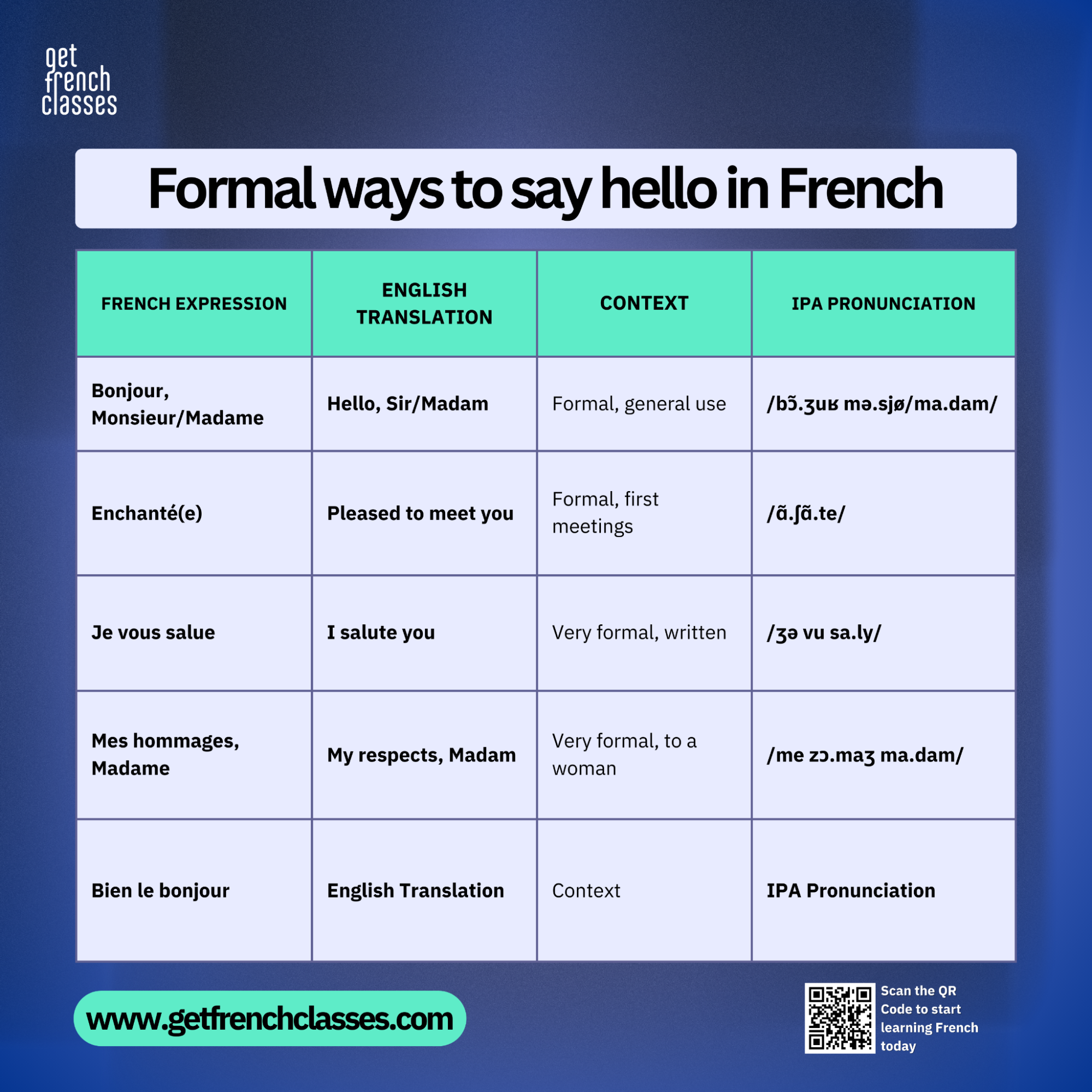
In formal situations, such as business meetings, official events, or when addressing people you don't know well or who are in positions of authority, it's important to use more polite and elaborate expressions of greeting.
| French Expression | English Translation | Context | IPA Pronunciation |
|---|---|---|---|
| Bonjour, Monsieur/Madame | Hello, Sir/Madam | Formal, general use | /bɔ̃.ʒuʁ mə.sjø/ma.dam/ |
| Enchanté(e) | Pleased to meet you | Formal, first meetings | /ɑ̃.ʃɑ̃.te/ |
| Je vous salue | I salute you | Very formal, written | /ʒə vu sa.ly/ |
| Mes hommages, Madame | My respects, Madam | Very formal, to a woman | /me zɔ.maʒ ma.dam/ |
| Bien le bonjour | A very good day to you | Formal, slightly old-fashioned | /bjɛ̃ lə bɔ̃.ʒuʁ/ |
-
At a business meeting:
" Bonjour, Monsieur. Je suis ravi(e) de faire votre connaissance. " ( Hello, Sir. I'm delighted to make your acquaintance. )
This combination of "Bonjour" with a title and a phrase expressing pleasure at meeting is standard in professional settings. It shows respect and politeness.
2. First time meeting your partner's parents:
" Enchanté, Madame. C'est un plaisir de vous rencontrer enfin. " ( Pleased to meet you, Madam. It's a pleasure to finally meet you. )
"Enchanté(e)" is a polite way to express that you're pleased to meet someone. It's often used in more formal or significant first meetings.
3. In a very formal letter: " Je vous salue et espère que cette lettre vous trouve en bonne santé. " ( I greet you and hope this letter finds you in good health. )
"Je vous salue" is a very formal greeting, more commonly used in writing than in speech. It conveys a high level of respect.
Casual and everyday hello expressions in French
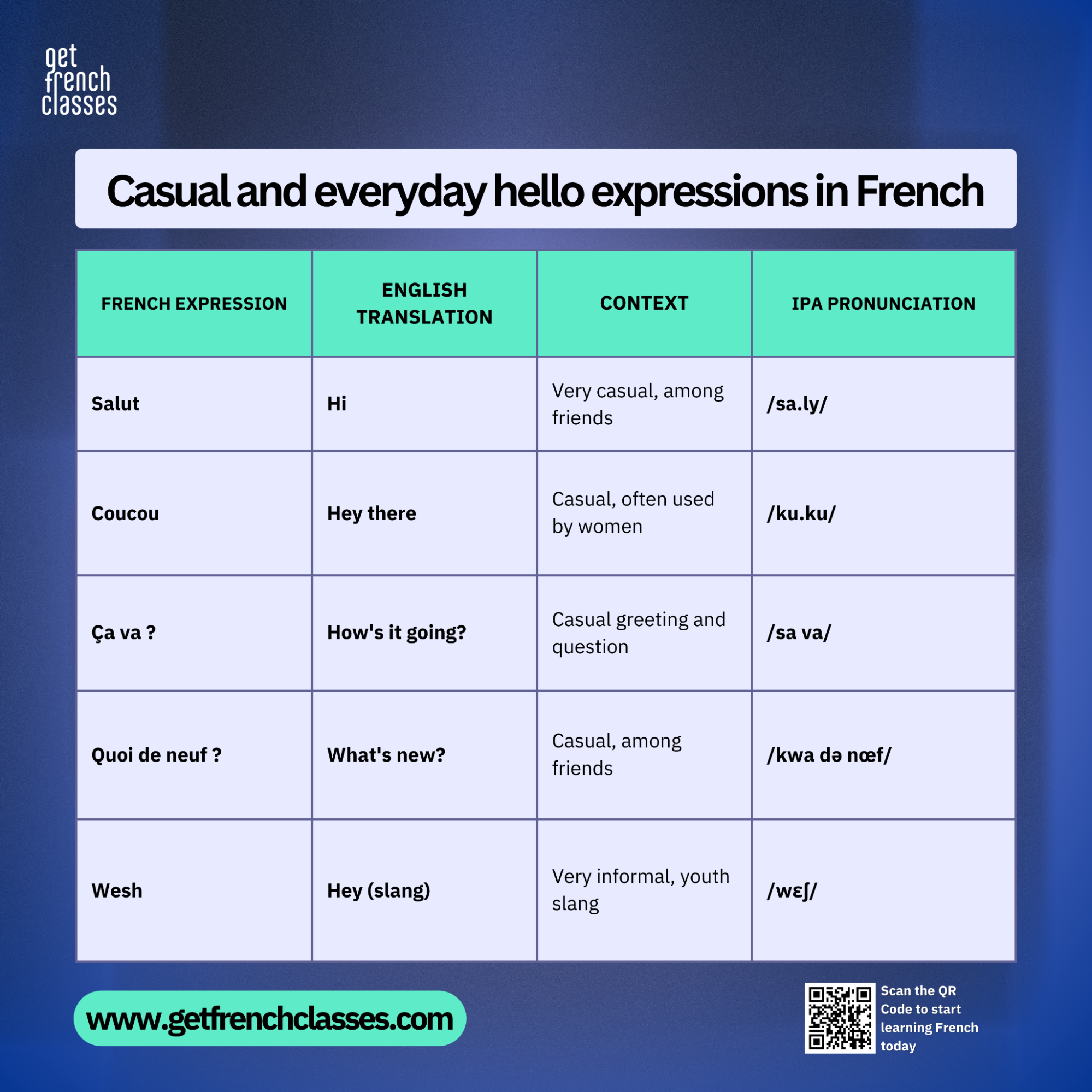
For everyday situations with friends, family, or in informal settings, you can use more relaxed expressions to say hello. These casual french greetings are perfect for daily use and will help you sound more natural in conversational French.
| French Expression | English Translation | Context | IPA Pronunciation |
|---|---|---|---|
| Salut | Hi | Very casual, among friends | /sa.ly/ |
| Coucou | Hey there | Casual, often used by women | /ku.ku/ |
| Ça va ? | How's it going? | Casual greeting and question | /sa va/ |
| Quoi de neuf ? | What's new? | Casual, among friends | /kwa də nœf/ |
| Wesh | Hey (slang) | Very informal, youth slang | /wɛʃ/ |
Examples and explanations:
-
Meeting a friend: Salut Thomas ! Ça fait un bail ! Hi Thomas! It's been a while!
"Salut" is very informal and is often used among close friends or peers. It's equivalent to "hi" or "hey" in English.
2 . Greeting a close friend or family member:
Coucou ma chérie ! Tu as passé une bonne journée ? Hey there, darling! Did you have a good day?
Je t'appelles pour te faire un petit coucou. I'm calling to say Hi
"Coucou" is a playful, affectionate greeting often used with close friends, family, or children. It's more common among women but can be used by anyone in very familiar settings.
3. Casual encounter with a colleague:
Salut Marie, ça va ? Hi Marie, how's it going?
Combining "Salut" with "ça va ?" is a common way to greet someone casually while also inquiring about their well-being.
Other ways to greet based on time of day in French
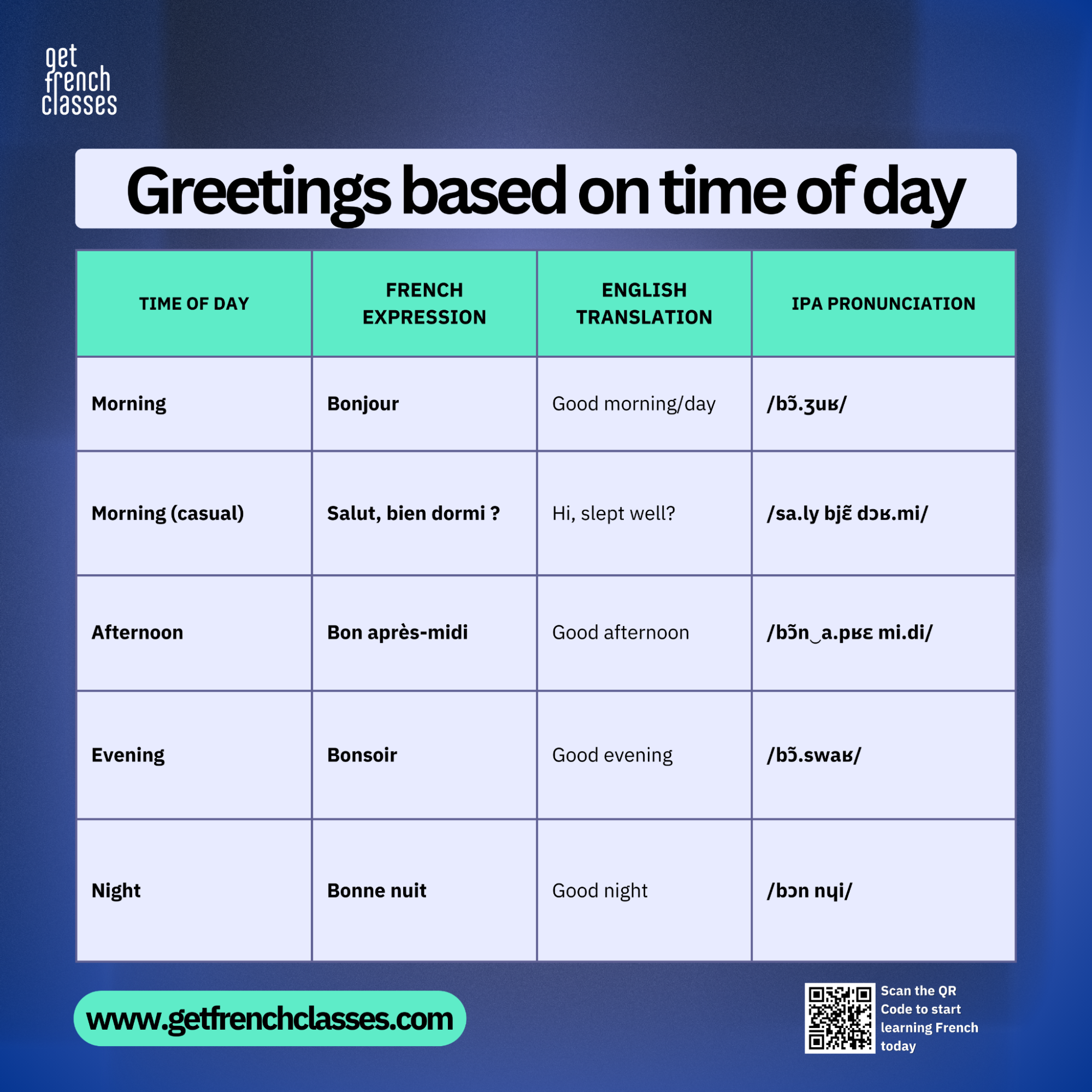
French has specific greetings for different times of the day, allowing you to add a touch of precision to your salutations.
| Time of Day | French Expression | English Translation | IPA Pronunciation |
|---|---|---|---|
| Morning | Bonjour | Good morning/day | /bɔ̃.ʒuʁ/ |
| Morning (casual) | Salut, bien dormi ? | Hi, slept well? | /sa.ly bjɛ̃ dɔʁ.mi/ |
| Afternoon | Bon après-midi | Good afternoon | /bɔ̃n‿a.pʁɛ mi.di/ |
| Evening | Bonsoir | Good evening | /bɔ̃.swaʁ/ |
| Night | Bonne nuit | Good night | /bɔn nɥi/ |
Examples and explanations:
-
Morning greeting to a colleague:
Bonjour Pierre, vous avez passé un bon weekend ? " ( Good morning Pierre, did you have a good weekend? )
"Bonjour" is used from morning until evening and is appropriate in both formal and informal contexts.
2. Casual afternoon greeting to a friend:
" Salut ! Bon après-midi, il fait beau aujourd'hui ! Hi! Good afternoon, it's nice weather today!
While "Bon après-midi" is more often used when leaving, it can also be used as a greeting in the afternoon.
3. Evening arrival at a dinner party:
Bonsoir tout le monde ! Merci de nous recevoir. Good evening everyone! Thank you for having us.
"Bonsoir" is used after sunset and is appropriate for both formal and informal situations.
4. Saying goodnight to family:
Bonne nuit, faites de beaux rêves ! Good night, sweet dreams!
"Bonne nuit" is specifically used when someone is going to bed or when you're leaving late at night. It's not a greeting, but a parting phrase.
Seasonal and holiday greetings in French
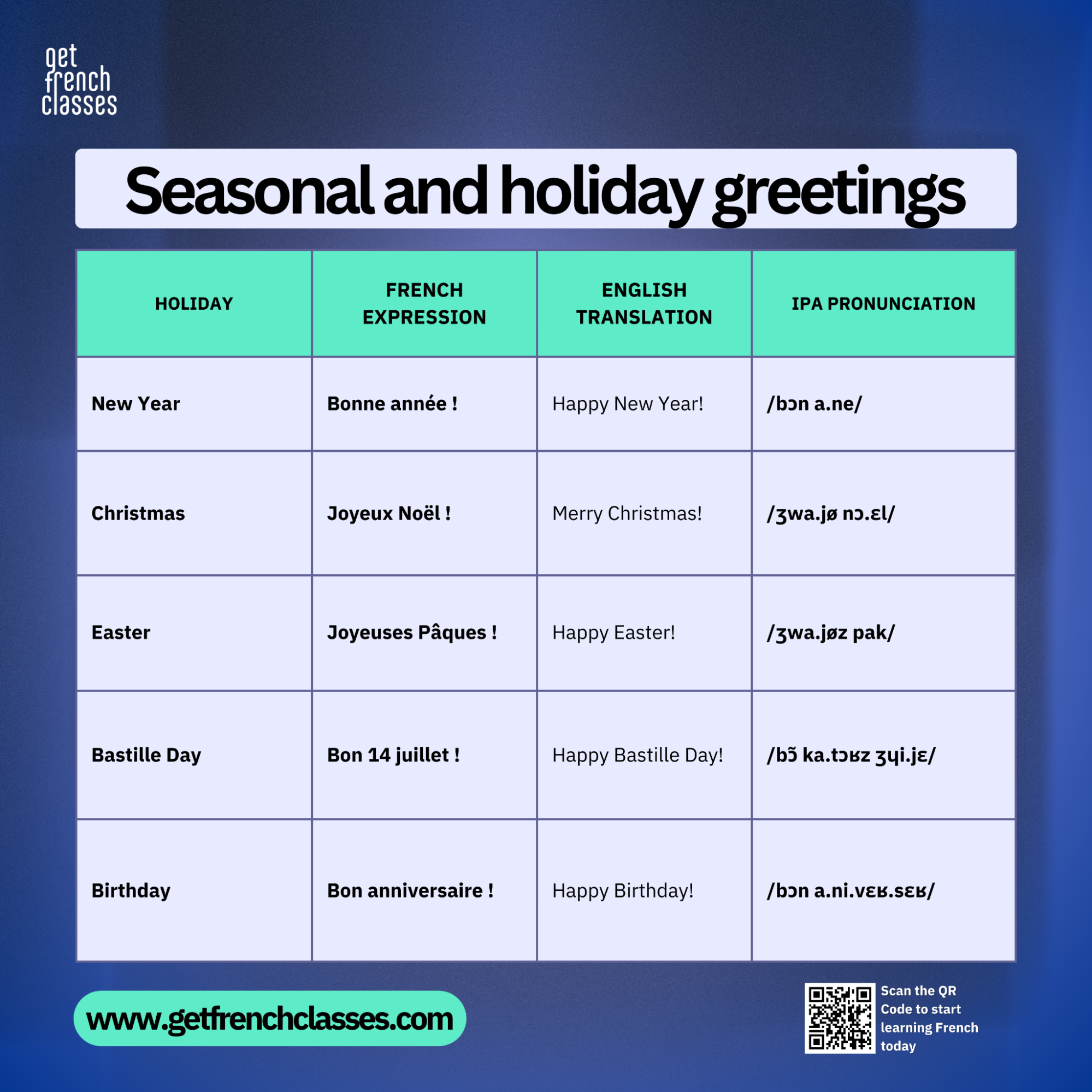
In French-speaking countries, holiday greetings are an important part of cultural and social interactions. Here are some common seasonal and holiday-specific greetings a French person uses:
| Holiday | French Expression | English Translation | IPA Pronunciation |
|---|---|---|---|
| New Year | Bonne année ! | Happy New Year! | /bɔn a.ne/ |
| Christmas | Joyeux Noël ! | Merry Christmas! | /ʒwa.jø nɔ.ɛl/ |
| Easter | Joyeuses Pâques ! | Happy Easter! | /ʒwa.jøz pak/ |
| Bastille Day | Bon 14 juillet ! | Happy Bastille Day! | /bɔ̃ ka.tɔʁz ʒɥi.jɛ/ |
| Birthday | Bon anniversaire ! | Happy Birthday! | /bɔn a.ni.vɛʁ.sɛʁ/ |
Examples and explanations:
-
New Year:
Bonne année et meilleurs vœux !c Happy New Year and best wishes!
This greeting is often accompanied by "meilleurs vœux" (best wishes) and is commonly used throughout January.
2. Christmas:
Joyeux Noël ! Passez de bonnes fêtes en famille. Merry Christmas! Have a good holiday with your family.
"Joyeux Noël" is used on Christmas Eve and Christmas Day. "Bonnes fêtes" (Happy Holidays) is also common during the festive season.
3. Easter:
Joyeuses Pâques ! J'espère que vous avez trouvé beaucoup de chocolats. Happy Easter! I hope you found lots of chocolates. )
Easter egg hunts are popular in France, hence the reference to finding chocolates.
4. Bastille Day:
" Bon 14 juillet ! Vous allez voir le feu d'artifice ce soir ? " ( Happy Bastille Day! Are you going to see the fireworks tonight?
Bastille Day (July 14th) is France's national day, often celebrated with fireworks and parades.
Other French greetings based on affinity and relationship

The way you greet someone in French often depends on your relationship with them. If French is a new language to you, don't fall into the trap of using any French greeting word you stumble upon to greet everyone. Here are some greetings based on different levels of affinity:
| Relationship | French Expression | English Translation | IPA Pronunciation |
|---|---|---|---|
| Close friends | Salut, ma poule ! | Hey, chicken! (friendly) | /sa.ly ma pul/ |
| Family members | Coucou, maman ! | Hey, mom! | /ku.ku ma.mɑ̃/ |
| Colleagues | Bonjour, cher collègue | Hello, dear colleague | /bɔ̃.ʒuʁ ʃɛʁ kɔ.lɛg/ |
| Acquaintances | Ravi de vous revoir | Glad to see you again | /ʁa.vi də vu ʁə.vwaʁ/ |
Examples and explanations:
-
Greeting a close friend: Salut, ma poule ! Ça fait un bail ! Hey, chicken! It's been a while!
"Ma poule" (my chicken) is a friendly, affectionate term. Such terms (mon pote, ma belle) are common among close friends.
2. Family greeting:
Coucou, papa ! Tu m'as manqué ! Hey, dad! I missed you!
"Coucou" is a warm, affectionate greeting often used with family and close friends.
3. Colleague greeting:
Bonjour, cher collègue. Prêt pour la réunion ? Hello, dear colleague. Ready for the meeting?
This greeting is friendly yet professional, suitable for workplace interactions.
4. Greeting an acquaintance: Bonjour, ravi de vous revoir. Comment allez-vous ? Hello, glad to see you again. How are you?
This polite greeting is perfect for people you know, but aren't close with.
French greeting slang and youth expressions
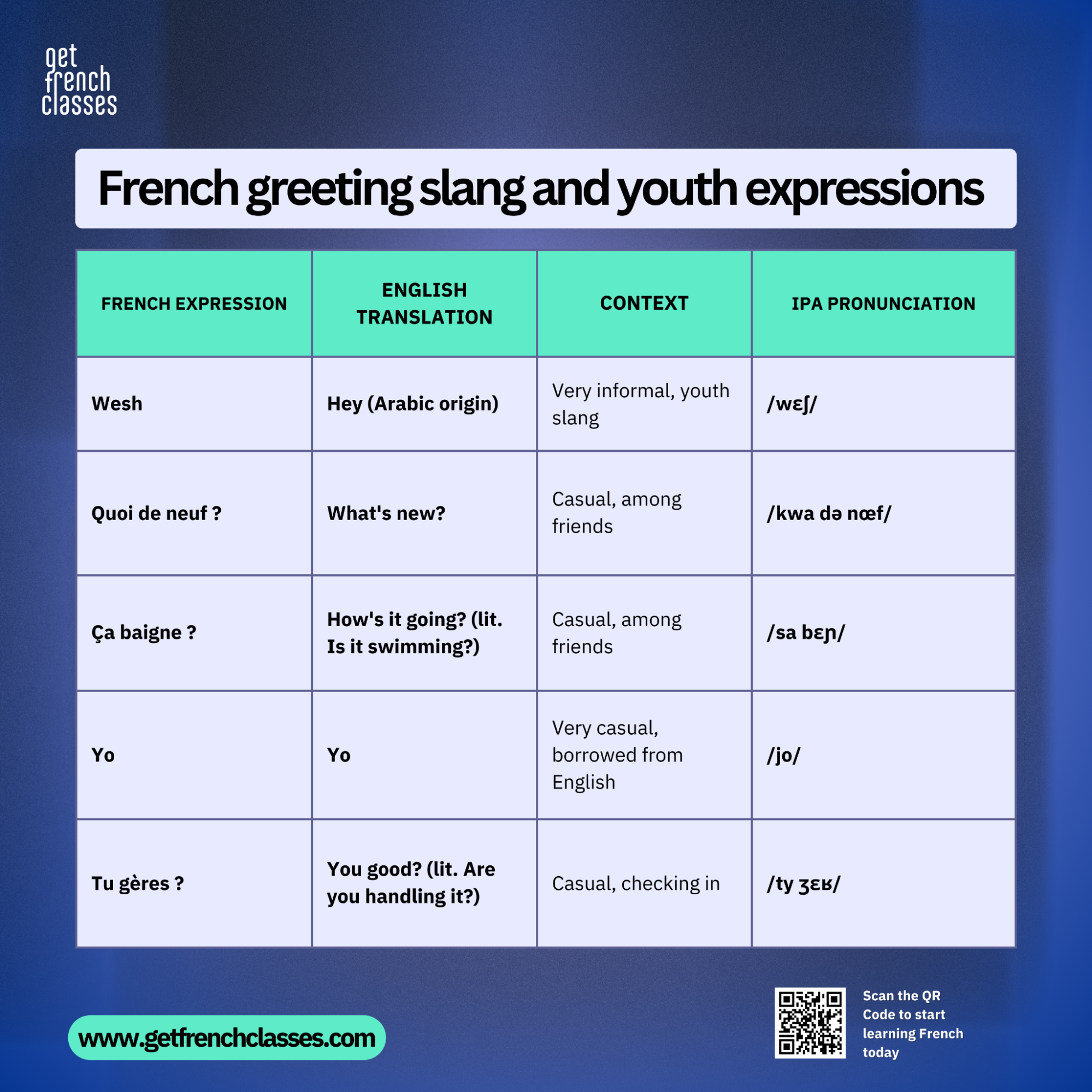
Young French speakers often use slang expressions to greet each other. These are informal and should be used carefully, as they may not be appropriate in all contexts.
| French Expression | English Translation | Context | IPA Pronunciation |
|---|---|---|---|
| Wesh | Hey (Arabic origin) | Very informal, youth slang | /wɛʃ/ |
| Quoi de neuf ? | What's new? | Casual, among friends | /kwa də nœf/ |
| Ça baigne ? | How's it going? (lit. Is it swimming?) | Casual, among friends | /sa bɛɲ/ |
| Yo | Yo | Very casual, borrowed from English | /jo/ |
| Tu gères ? | You good? (lit. Are you handling it?) | Casual, checking in | /ty ʒɛʁ/ |
Usage examples and generational context:
-
Among close friends:
Wesh, les gars ! Quoi de neuf ? Hey guys! What's new?
"Wesh" is very informal and mainly used by younger generations, particularly in urban areas. It has Arabic origins.
2. Casual ways of greeting between young people:
Salut ! Ça baigne ? Hi! How's it going?
"Ça baigne ?" is a relaxed way to ask how someone is doing. It's more common among younger French speakers.
3. Greeting a friend you haven't seen in a while: Yo, mec ! Tu gères ? Yo, dude! You good?
This combination of English-borrowed "Yo" and French slang "Tu gères ?" is very casual and typically used by younger people.
Regional ways to say hello in French-speaking countries
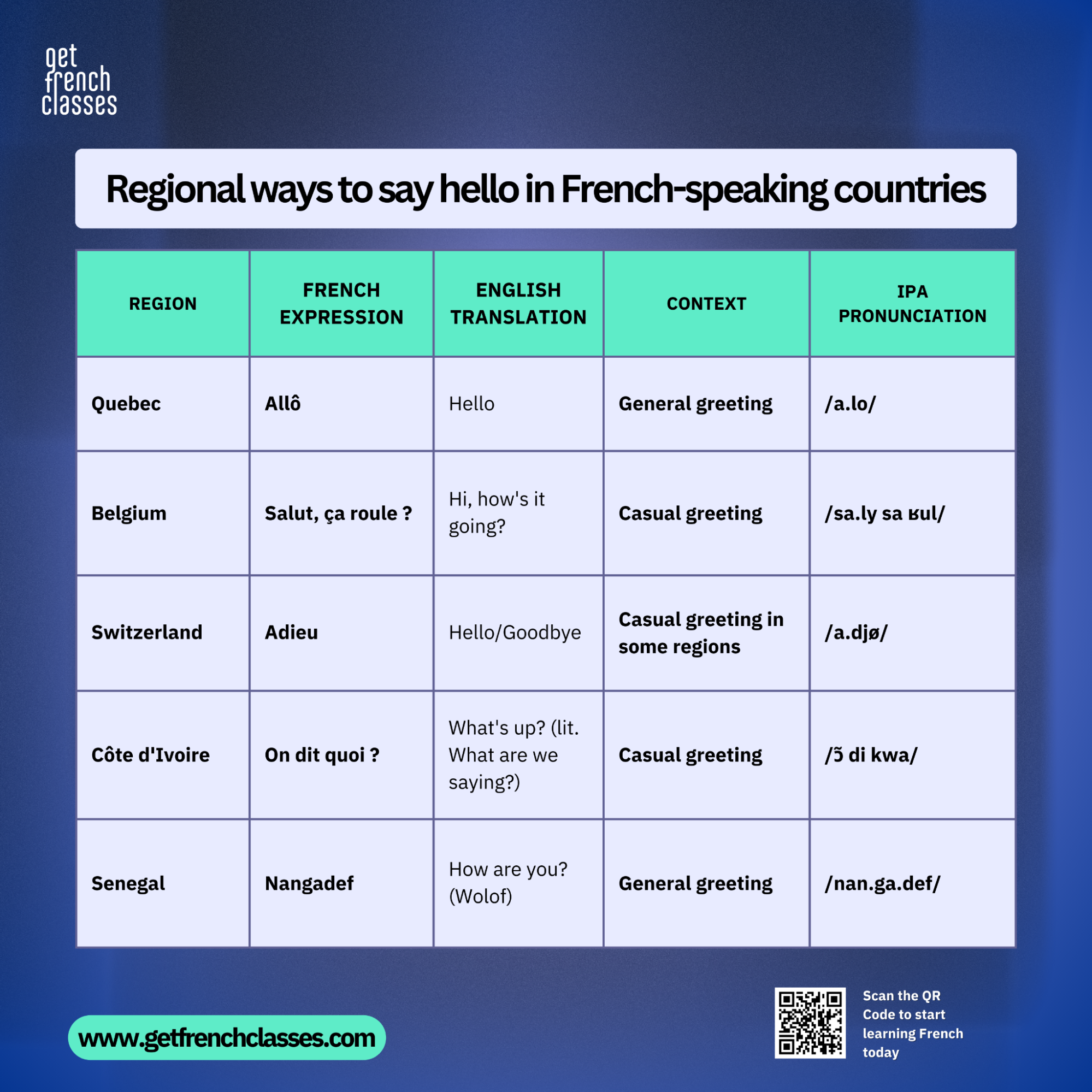
French is spoken in many countries around the world, and each region has developed its own unique greeting expressions. Let's explore some ways to say hello in the Francophone world.
| Region | French Expression | English Translation | Context | IPA Pronunciation |
|---|---|---|---|---|
| Quebec | Allô | Hello | General greeting | /a.lo/ |
| Belgium | Salut, ça roule ? | Hi, how's it going? | Casual greeting | /sa.ly sa ʁul/ |
| Switzerland | Adieu | Hello/Goodbye | Casual greeting in some regions | /a.djø/ |
| Côte d'Ivoire | On dit quoi ? | What's up? (lit. What are we saying?) | Casual greeting | /ɔ̃ di kwa/ |
| Senegal | Nangadef | How are you? (Wolof) | General greeting | /nan.ga.def/ |
Examples and cultural insights:
Allô! Comment ça va? Hello! How are you?
While "Allô" in France is typically used for answering the phone, in Quebec it's a common general greeting. Quebecois French often preserves older French usages.
Salut! Ça roule, ma poule? Hi! How's it rolling, chicken?
"Ça roule?" is a typical Belgian way of asking "How's it going?" The addition of "ma poule" (my chicken) is a friendly, affectionate term.
Adieu, comment vas-tu? " ( Hello, how are you? )
In some parts of Switzerland, particularly the canton of Valais, "Adieu" is used as both a hello and goodbye. This can be confusing for other French speakers!
1 - In Côte d'Ivoire: " On dit quoi, mon frère? " ( What's up, my brother? )
This greeting is very common in Ivorian French. It's a casual way to greet friends and ask how they're doing.
2 - In Senegal:
" Nangadef! Ça va bien? " ( How are you! Are you doing well? )
"Nangadef" is a Wolof greeting often used even when speaking French, showcasing how local languages influence French in different regions.
Situational greetings in French
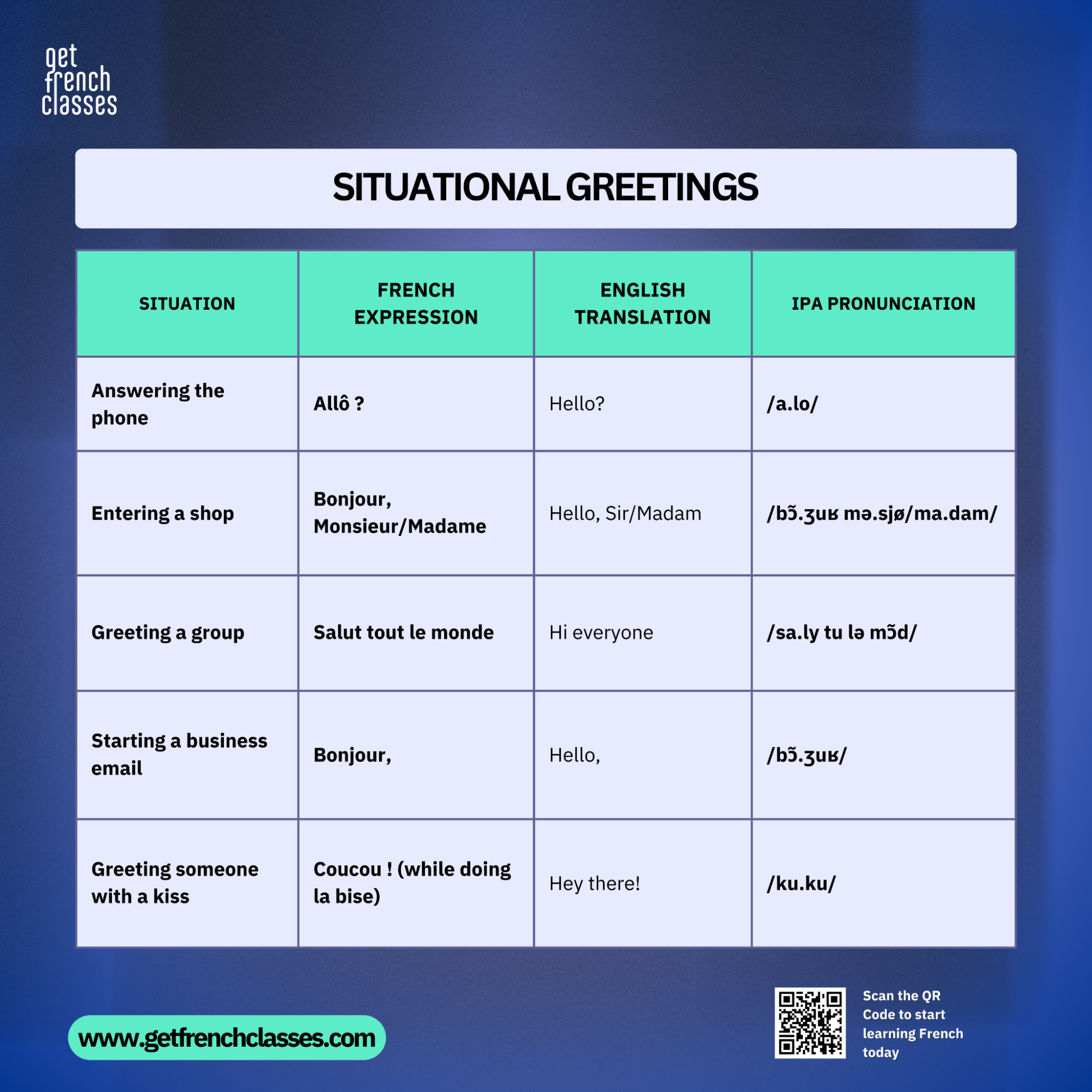
Different situations call for different ways of greeting in French. Here are some expressions tailored for specific contexts.
| Situation | French Expression | English Translation | IPA Pronunciation |
|---|---|---|---|
| Answering the phone | Allô ? | Hello? | /a.lo/ |
| Entering a shop | Bonjour, Monsieur/Madame | Hello, Sir/Madam | /bɔ̃.ʒuʁ mə.sjø/ma.dam/ |
| Greeting a group | Salut tout le monde | Hi everyone | /sa.ly tu lə mɔ̃d/ |
| Starting a business email | Bonjour, | Hello, | /bɔ̃.ʒuʁ/ |
| Greeting someone with a kiss | Coucou ! (while doing la bise) | Hey there! | /ku.ku/ |
Examples and etiquette tips:
-
Answering the phone: " Allô, qui est à l'appareil ? " ( Hello, who's speaking? )
Etiquette tip : Unlike in English, "Allô" is used only for phone conversations in France. It's not a general greeting.
2. Entering a shop: " Bonjour, Madame. Je cherche... " ( Hello, Madam. I'm looking for... )
Etiquette tip : Always greet shop staff when entering and leaving. It's considered rude not to do so.
3. Greeting a group of colleagues:
" Bonjour à tous ! J'espère que vous avez passé un bon weekend. " ( Hello everyone! I hope you had a good weekend. )
Etiquette tip : In professional settings, it's polite to greet the entire group when entering a room.
4. Starting a business email: " Bonjour,
J'espère que ce message vous trouve bien. Je vous contacte au sujet de... "
( Hello,
I hope this message finds you well. I'm contacting you regarding... )
Etiquette tip : In formal emails, it's common to start with "Bonjour," followed by a line break. No need to add a name unless you're addressing someone specific.
5. Greeting a friend with la bise: " Coucou, ma chérie ! Ça fait longtemps ! Hey there, darling! It's been a long time!
Etiquette tip : La bise (cheek kissing) is common among friends and family, but the number of kisses varies by region. Follow the lead of the locals.
Remember, in French culture, greetings are crucial for positive social interactions. Forgetting to greet someone or using the wrong level of formality can be seen as rude. When in doubt, it's better to err on the side of formality, especially in professional or unfamiliar situations.
How to respond to greetings in French
Knowing how to respond when someone greets you is just as important as knowing how to say hello. In French, there are various ways to reply to greetings, depending on the context and level of formality.
| French Greeting | Common Response | English Translation | IPA Pronunciation |
|---|---|---|---|
| Bonjour | Bonjour | Hello | /bɔ̃.ʒuʁ/ |
| Comment allez-vous ? | Très bien, merci. Et vous ? | Very well, thank you. And you? | /tʁɛ bjɛ̃ mɛʁ.si e vu/ |
| Ça va ? | Ça va bien, et toi ? | It's going well, and you? | /sa va bjɛ̃ e twa/ |
| Salut | Salut ! | Hi! | /sa.ly/ |
| Comment vas-tu ? | Pas mal, merci | Not bad, thanks | /pa mal mɛʁ.si/ |
Examples and explanations:
-
In a formal setting:
-
Person A : " Bonjour, Madame. Comment allez-vous ? "
-
Person B : " Bonjour, Monsieur. Je vais bien, merci. Et vous-même ? "
Usage tip : In formal situations, it's polite to repeat the greeting and ask about the other person's well-being in return. The use of "vous" maintains the formal tone. Remember "bonjour" work in almost any situation.
2. Among friends:
-
Friend A : " Salut ! Ça va ? "
-
Friend B : " Salut ! Ouais, ça va. Et toi ? "
Usage tip : With friends, you can use casual expressions. "Ouais" is an informal way of saying "yes" and the most common way to say "Yes" among the youth.
3. Responding to "Comment vas-tu ?":
-
Person A : " Salut Marie, comment vas-tu ? "
-
Person B : " Pas mal, merci. Un peu fatiguée, mais ça va. "
Usage tip: "Pas mal" (not bad) is a common, slightly understated way to say you're doing fine. It's often followed by a brief explanation if you want to elaborate.
4. When you're not doing well:
-
Person A : " Bonjour, ça va ? "
-
Person B : " Bof, pas terrible. J'ai attrapé un rhume. "
Usage tip : "Bof" is an informal way to express that things aren't great. It's often accompanied by a brief explanation.
5. Responding to a group greeting:
-
Person A : "Bonjour à tous !"
-
Group : "Bonjour !" (Everyone responds)
Usage tip : When someone greets a group, it's common for everyone to respond. You don't need to add "à tous" in the response.
Additional tips:
-
The "How are you?" question (Comment allez-vous ? / Ça va ?) is often used as part of the greeting and doesn't always require a detailed response.
-
It's common to ask "Et vous ?" (And you?) or "Et toi ?" (And you? - informal) after responding to a "How are you?" question.
-
If someone asks "Ça va ?" you can simply respond with "Ça va" to indicate that you're doing fine.
-
In very informal situations, especially among younger people, you might hear "Ça dit quoi ?" as a greeting. You can respond with "Ça dit bien, et toi ?" (It's saying good, and you?)
-
Remember to match the level of formality used by the person greeting you, unless you're in a position where maintaining formality is important (e.g., speaking to a superior at work).
How to say Hello in French FAQ
Here are some frequently asked questions about greetings in French, along with concise, informative answers:
Is it rude not to say "bonjour" when entering a shop in France?
Yes, it's considered impolite. In France, it's customary to say "bonjour" when entering any shop, café, or small business. Failing to do so can be seen as disrespectful to the staff.
How do I know whether to use "tu" or "vous" when greeting someone?
Use "vous" for formal situations, with people older than you, or those you don't know well. Use "tu" with friends, family, children, and in casual settings. When in doubt, start with "vous" — the other person may invite you to use "tu" if appropriate.
What's the difference between "bonsoir" and "bonne soirée"?
"Bonsoir" is a greeting meaning "good evening," used when you arrive or meet someone in the evening. "Bonne soirée" means "have a good evening" and is used when parting ways in the evening.
How do I greet someone in French on the phone?
When answering the phone, say "Allô?" When making a call, start with "Bonjour" or "Bonsoir," then introduce yourself: "Bonjour, c'est [Your Name]."
Is "salut" appropriate to use with everyone?
No, "salut" is informal and should only be used with friends, family, and peers in casual settings. It's not appropriate for formal situations or with people you don't know well.
How do French-Canadians greet differently from the French?
French-Canadians, particularly in Quebec, might use "Allô" as a general greeting, not just for phone calls. They also tend to use "Bonjour" more frequently throughout the day, whereas in France, people often switch to "Bonsoir" in the evening.
What's the proper way to do "la bise" (cheek kissing)?
Start by leaning in towards the right cheek (your right, their left). The number of kisses varies by region (usually 2-4). It's more of a cheek-touch with a kissing sound rather than an actual kiss. However, be aware that since the COVID-19 pandemic, many people have become less comfortable with la bise.
How late in the day can I say "bonjour"?
You can say "bonjour" all day until evening. Once it's dark or around dinner time, switch to "bonsoir." There's no exact time to switch; use your judgment based on the light and social context.
Are there any gestures that accompany French greetings?
Yes, besides la bise, a handshake is common in formal settings. A slight nod or wave can accompany verbal greetings. In casual settings, friends might greet each other with a hand slap followed by a fist bump.
How do I greet a group of people in French?
You can say "Bonjour à tous" (Hello everyone) or "Salut tout le monde" (Hi everybody) in more casual settings. In formal situations, you might say "Mesdames, Messieurs, bonjour" (Ladies and Gentlemen, hello).
So, how to say hello in french?
